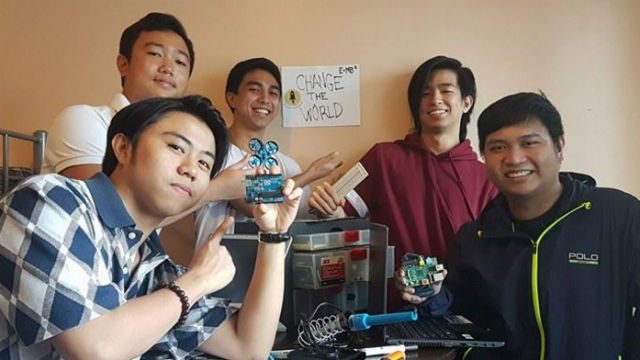SUMMARY
This is AI generated summarization, which may have errors. For context, always refer to the full article.

In the corporate world, work and home are two separate entities. But for 21-year-old tech entrepreneur Russ Earl Malangen, they are one and the same: he lives in a modest apartment that also serves as the headquarters for his startup company, LX Innovative Solutions.
Located just beside De La Salle University (DLSU) in Taft, Malangen’s flat contains what you’ll find in a typical home for the college or the recently-out-of-college crowd: double deck beds, a mini kitchen, and a small common table. Except the table is littered with various machine parts, and a single sheet of white pape plastered on the wall with the words, “Change the World” and in a smaller font size, “E=mb squared”.
About the reference to the famous Einstein formula, Malangen, the young company’s founder and CEO, says it’s a joke, showing that “we, entrepreneurs, don’t know everything,”
A college student in his fourth year of Manufacturing and Engineering Management in DLSU, Malangen shares the flat with three of his co-workers, all of whom are still in college: Gabriel Melendres (20), Paolo Gonzales (22) and Tatsuya Sato (21). Their intern, Joseph Katigbak (19) lives just next door.
“Change the world” is their mantra, which for the older, more jaded lot is perhaps hackneyed. But for this young group, it holds water, if only for their inspiring enthusiasm to stoke the entrepreneurial spirit this early on.
What drives this enthusiasm? What drives young individuals to take a stab at the competitive startup industry? In an interview with Rappler, they answer these, hopefully inspiring more young potential entrepreneurs to start early and pine for startup success.
“A different dream”
Two years ago, LX Innovative Solutions was a mere idea born in a coffee
shop. At present, they offer automation solutions to various industries using robotics and AI. Currently, they have in-development projects like CULTERRA: Automated Outdoor Smart Farming Modules; LIFELINE: Wearable Emergency Room Peripherals with Advanced Analytics; and the Retail Store Consumer Analytics Module for Real-Time Footprint Tracking, to name a few. Their portfolio is here.
“I entered the startup scene way back in 2015,” Malangen said, who admits that his
love for tech goes back to his childhood days. “I used to be part of the Robotics team in grade school and high school at La Salle Greenhills. Soon, I did a bit of programming [and tried out] other fields like AI and Internet of Things (IoT). In college, I entered and won in hackathons.”
Asked why he ventured into the startup scene, Malangen explained that many college graduates usually went into corporate jobs that, for him, didn’t allow for self-fulfilment. “I wanted to stray away from the whole corporate thing. I wanted to do something where I can be in control and where I can be at my own pace,” he said.
Melendres, the cofounder and chief marketing officer, agrees with him. “Working for multinational companies is a dream come true for some students. For us, we want
something different – for ourselves and for the people around us. When you’re in the
startup industry, it’s not all about the money. It’s basically finding a problem and finding a solution – that has never been done before,” Melendres said, who had also won in a pitching competition before.
Melendres added, “I thought it was all about the money. But after being in the startup scene, I found my own passion. Ever since, I became more self-aware.”
For Sato, the business operations associate, finding like-minded friends who shared
his interest was the key factor in his involvement in tech startups.
Recently Sato and Gonzales, pictured below, won the Nikkei Special Award in the FIN/SUM FinTech Summit 2017, a pitching competition in Japan.

Katigbak, the intern who specialized in embedded systems engineering – a branch of computer engineering focusing on the synergy of hardware and software – admitted that his interest in startups was a result of being an “inventor by heart.” “Through my
inventions, I can help a lot of people, and bring value to their lives,” he said.
On solving problems and sustainability
“It’s a good time to be an entrepreneur here in the Philippines. There are a lot of
problems around us. Just go outside and you will see a lot of problems,” Malangen
notes, gesturing to the window overlooking a congested Taft avenue. It was barely 3 in the afternoon and a gray mist hung over the air.
“The only proven ways to achieve innovation are through startups and entrepreneurship. They are the only ways that prove that humans have evolved,” Malangen said.
“Entrepreneurship should be sustainable. Your robots, projects and machines will cost a lot of money. So if you’re not going to make money [in your startup], it’s not
sustainable,” he explained.
One way to make a startup sustainable is by looking for investors. The team mentions the funding rounds for startups: the angel round, the seed round, and the series rounds.
According to Malangen, the angel round is where angel investors invest below $200,000. The seed round is where venture capitalists invest above $200,000.
“After the seed round comes the series A and series B rounds. If you get past the
series A round here, you’re someone special,” Malangen said.
Melendres said that their tech company is currently in the seed round stage. “We
aren’t planning for the series A and B stages yet, because we know we still need significant traction. We also need good feedback and revenue,” he noted.
They’ve started things, and that’s a major step forward, but the guys are well aware that they haven’t proven anything yet.
Gonzales then mentions the importance of choosing the right investors as an important step. It’s not just about getting people to fund you; it’s also a matter of attracting investors that share one’s vision.
“Getting the right investors is another thing. [The process] is like [that of] Shark Tank,” Gonzales said, referring to the US reality show series.
“You need to find the right investor for you. Just because this person’s going to put a lot of money on you, doesn’t mean that he’s the right person for you. Some investors
actually offer value, in terms of advice they can give and professional networks,”
Gonzales said.
Ask around too if an investor is credible or not, they advise, or whether an investor really has your best interests in mind. “Sometimes, investors will surprise young, eager entrepreneurs with, let’s say, P2 million, and then they’ll ask for 57% equity,” Melendres said.
“People who are in the lower 20s may think that 2 and 3 million pesos is a ridiculous amount of money. That’s actually small for a company; it won’t last you long. What those investors are saying is, “I’ll give you 2 million pesos for more than half your company,” he said.
When your company scales up, then that investor would own more than half of your company, have controlling interest, and thus, can practically boot you out of your own company, they explained.
What they’re saying is, when you’re young and eager, it’s easy to be blinded by money being thrown your way. Money opens up possibilities. But temper that excitement, they said – lest you want to be locked in a deal with the devil.
Beyond getting financial investments
Asked about his advice to aspiring tech startup entrepreneurs in the Philippines,
Malangen says that it’s all about keeping networks, amping up one’s business skills and persevering through hardship.

“You just have to think,” Melendres said. “Think of how big you can be, but focus on the necessary steps on how to develop your minimum viable product (MVP). Also, stay grounded to reality. Don’t let it get to your head,” he smiles.
An MVP is a development technique in which a company rolls out a product with sufficient features to early adopters. The company then gets the feedback from the adopters, incorporating these into a newer version of the product.
“An MVP rolling today is better than a perfect one tomorrow,” Malangen adds. “If you
keep thinking of something perfect, there’s going to be a lot of delays.”
For Sato, aspiring tech entrepreneurs should read a lot of books. “A few notable books are Zero To One by Peter Thiel with Blake Masters; and Lean Startup by Eric Ries,” he said.
Sato quoted a book author when he mentioned that startups should focus on a niche
market. “Niche markets are neglected by big companies. So focus on these and attend to their needs,” he said.
For Katigbak, it’s normal to start a company without business partners. “The idea needs to come from you. You have to go alone so you can go quick. It’s kind of lonely. But when people start noticing your work, they will understand it. Then you’ll meet people who’ll help you along the way,” he reassured.
The entire team then agreed that failure was inevitable.
“In the startup scene, you’re going to fail. But what matters is how many times you’re
going to fail, and get back up,” Malangen said, noting that the rate of startup successes is 10%.
“If you’re afraid of that fact, then you don’t belong in the startup scene,” he says. – Rappler.com
Add a comment
How does this make you feel?
There are no comments yet. Add your comment to start the conversation.